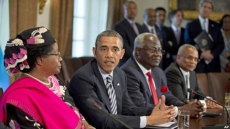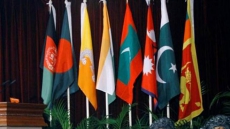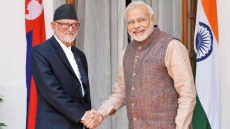Free snacks, monthly meetings for co-dependent carnivores and radio programmes are some of the initiatives vegetarians and vegans are undertaking to promote their lifestyle in Uruguay, the South American country which has one of the world's most meat-loving populations.
Several business concerns are offering meat-free products in a country where an average of 101.2 kg of meat per capita is consumed yearly, boosting Uruguay to first place in the ranking of meat-eating countries, ahead of its neighbour, Argentina.
In Uruguay, there is "a not very varied cuisine" with "little to choose from" beyond "the traditional roast, pizza and schnitzel (breaded meat fillets)", said Hiram Miranda, one of those responsible for "La Papa", the first vegan restaurant in Uruguay's capital Montevideo.
Meat consumption in Uruguay is rooted deep in the country's past, especially the 18th and 19th centuries, when the gauchos who inhabited the area made their living by breeding livestock, and dined almost exclusively on animals.
Today, meat products are still exported from Uruguay, generating an annual turnover of $1.8 billion. At social events, meat is always present and barbecues are a common element in these get-togethers.
This is where vegetarian-based initiatives like the snack collective hosted by "La Papa", are stepping forward to actively promote recipes for carrot crackers, hummus, sunflower, lettuce, and fruit tarts or pies.
Interest in vegetarianism emerged a few years ago, "for health reasons," Efe news agency was told by Fiorella Monetti, who runs a business based on organic vegetables, legumes, nuts and spices, all of them healthier alternatives than are found in Uruguay's traditional diet.
Mary Noel Silvera, author of a blog about vegan food in Montevideo, www.caramelosdelima.com, said these activities and initiatives helped increase the supply of meat-free products to help "break the myth" that this type of diet was "boring ".
"When we started this project, we did not know how long we could keep our pledge to publish once a week about a place to go out to eat vegan," confessed the Uruguayan blogger. "But soon we realised that there are many options", even in "conventional places".
Noel argued that the vegetarian dishes should be made to look "accessible and delicious", in order to generate more demand for them.
This approach is shared by the Vegetarian Union of Uruguay, in monthly meetings open to all people who want to share ideas, swap recipes and get answers to their questions about vegetarianism.
Official nutrition plans and traditional dishes of Uruguay that always include meat, are a "wall" that vegetarians admit would be impossible to bring down, so they try to overcome it by alternative pathways.
One example of such an alternative is a weekly radio show on veganism, presented by the head of the Vegetarian Union, Andres Prieto, who explained his philosophy over the airwaves for a month on the station run by the Spanish Culture Centre.





